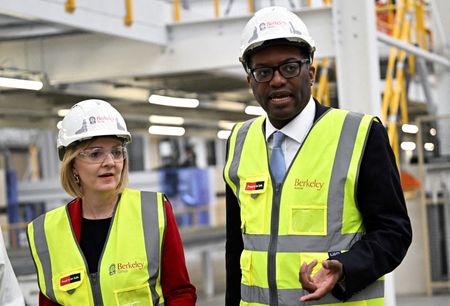By Geoffrey Smith
Investing.com -- U.K. government bonds extended their rally on Friday on expectations that Prime Minister Liz Truss will be forced to abandon her plans for massive unfunded tax cuts.
By 03:25 ET (07:25 GMT), the yield on the benchmark 30-Year Gilt - which had topped 5% earlier in the week - was back down at 4.51%. However, the rally appeared to be running out of steam, as it had opened a full four basis points lower.
The 2-Year Gilt yield, more sensitive to expectations of near-term interest rate changes by the Bank of England, was down a much sharper 16 basis points at 3.63%, while the 10-Year benchmark was down 6 basis points at 4.13%.
Gilts have had a wild ride this week as many U.K. pension funds were forced by leveraged investing strategies to raise large amounts of collateral to meet margin calls on long-dated interest rate derivatives. To do that, they have sold vast amounts of Gilts, the most liquid securities in their portfolio. That has driven market interest rates up to their highest since before the Great Financial Crisis in 2008.
The Bank of England has injected nearly 18 billion pounds of liquidity into the market by buying the Gilts dumped by pension funds, but said earlier this week it will end its outright purchases on Friday. The Bank issued a statement earlier Friday morning saying it reserved the right to adjust the current £10 billion cap on today's purchases as necessary. It had earmarked an upper limit of £65 billion to ensure that conditions in the U.K.'s most important market remained orderly.
Gilts and the pound had rallied hard on Thursday, in anticipation of a comprehensive U-turn by Truss and her Chancellor of the Exchequer Kwasi Kwarteng. Truss has already dropped her plan to cut income tax for the top 2% of U.K. earners, but this only represents a small fraction of a fiscal giveaway estimated at over £100 billion.
Sky News and others have reported that Kwarteng - who will arrive back in the U.K. by mid-morning after cutting short his attendance at the International Monetary Fund's autumn meeting - will after all allow the rate of corporate income tax to rise next year. His predecessor, Rishi Sunak, had intended to raise it to 25% from an emergency level of 19% adopted during the pandemic.
The Times, meanwhile, reported late on Thursday that Conservative Party lawmakers are already hatching plans to depose Truss as leader after less than two months in the job, replacing her with a combination of Sunak and Penny Mordaunt, two of the candidates that she beat in the race to succeed Boris Johnson over the summer.
“The markets are not woke, the markets are not left. The fact they are not lefty, anti-government, the fact they have been spooked, is something that should be taken incredibly seriously." Alicia Kearns, the new chair of the Foreign Affairs Committee, said in a radio interview on Thursday.
The Conservatives have hemorrhaged popular support due to the turmoil of the last two weeks. Two polls in 48 hours, by YouGov and Polling People, have both put support for the opposition Labour Party at over 50%, with the Tories polling below 20%.
